Morphology of bacteria - Study guides, Class notes & Summaries
Looking for the best study guides, study notes and summaries about Morphology of bacteria? On this page you'll find 1076 study documents about Morphology of bacteria.
Page 3 out of 1.076 results
Sort by
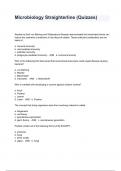
-
Microbiology Straighterline (Quizzes) ( Answered
- Exam (elaborations) • 37 pages • 2024
- Available in package deal
-
- $14.99
- + learn more
Microbiology Straighterline (Quizzes) ( Answered Studies by Emil von Behring and Shibasaburo Kitasato demonstrated that inactivated toxins can induce the synthesis of antitoxins in the blood of rabbits. These antitoxins (antibodies) are the basis of... a. humoral immunity b. cell-mediated immunity c. antibiotic immunity d. phagocyte-mediated immunity - ANS a. humoral immunity Who of the following first discovered that some blood leukocytes could engulf disease-causing bacteria...
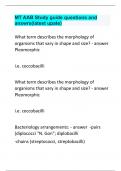
-
MT AAB Study guide questions and answrs(latest upate)
- Exam (elaborations) • 853 pages • 2024
- Available in package deal
-
- $14.49
- + learn more
What term describes the morphology of organisms that vary in shape and size? Pleomorphic i.e. coccobacilli What term describes the morphology of organisms that vary in shape and size? Pleomorphic i.e. coccobacilli Bacteriology arrangements: -pairs (diplococci "N. Gon"; diplobacilli -chains (streptococci, streptobacilli) -grape like clusters (staphylococci) -group of four-tetrads (peptococcus) -packets of eight-cuboidal (sarcina) -palisades (corneybacterium) B...
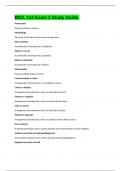
-
BIOL 114 Exam 3 Study Guide.
- Exam (elaborations) • 9 pages • 2024
- Available in package deal
-
- $10.99
- + learn more
BIOL 114 Exam 3 Study Guide. Prokaryotes Bacteria without a nucleus Morphology The study of the form and structure of organisms Rod or bacillus A prokaryotic cell shape that is cylindrical
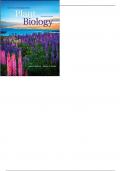
-
Stern's Introductory Plant Biology 14th Edition James Bidlack - Test Bank
- Exam (elaborations) • 479 pages • 2023
-
- $23.84
- 1x sold
- + learn more
Stern's Introductory Plant Biology, 14e (Bidlack) Chapter 1 What Is Plant Biology? 1) The early scientist who first demonstrated experimentally that plants do not have the same modes of nutrition as animals was A) Nehemiah Grew. B) Carl Willdenow. C) Alexander von Humboldt. D) Sir J. D. Hooker. E) J. B. van Helmont. Answer: E Topic: Diversification of Plant Study Bloom's: 1. Remember Learning Outcome: 01.04 List the aspects of botany with which each of the major botanical disciplines ...
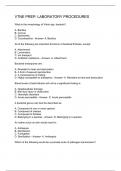
-
VTNE Prep: Laboratory Procedures
- Exam (elaborations) • 72 pages • 2023
- Available in package deal
-
- $14.49
- + learn more
What is the morphology of Vibrio spp. bacteria? A. Bacillus B. Coccus C. Spirochete D. Coccobacillus - Answer- A. Bacillus All of the following are important functions of bacterial fimbriae, except: A. Attachment B. Locomotion C. Ion transport D. Antibiotic resistance - Answer- A. Attachment Bacterial endospores are: A. Resistant to heat and desiccation B. A form of asexual reproduction C. A consequence of mating D. Highly susceptible to antiseptics - Answer- A. Resistant...
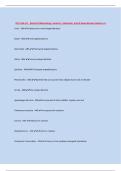
-
MT 6320 LEC - Bacterial Morphology, Genetics, Cultivation, and ID Exam Review Solution A+
- Exam (elaborations) • 11 pages • 2024
-
- $9.99
- + learn more
MT 6320 LEC - Bacterial Morphology, Genetics, Cultivation, and ID Exam Review Solution A+ Cocci - ANS-spherical or round shaped bacteria Bacilli - ANS-rod shaped bacteria Spirochete - ANS-thin spiral shaped bacteria Vibrio - ANS-comma shaped bacteria Spirillum - ANS-thick spiral shaped bacteria Pleomorphic - ANS-bacteria that can assume many shapes due to lack of cell wall Arcula - ANS-box shaped bacteria Appendaged bacteria - ANS-composed of stalk, holdfast, hyphae, and bud Filamentous...
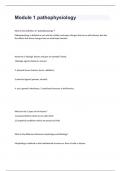
-
Module 1 pathophysiology questions and answers graded A+
- Exam (elaborations) • 17 pages • 2024
-
- $17.99
- + learn more
Module 1 pathophysiologyWhat is the definition of "pathophysiology"? Pathophysiology is defined as not only the cellular and organ changes that occur with disease, but also the effects that these changes have on total body function. Name the 5 etiologic factors and give an example if listed. 1.Biologic agents (bacteria, viruses) 2. physical forces (trauma, burns, radiation), cal agents (poisons, alcohol) 4. one’s genetic inheritance, tional excesses or deficiencies. ...
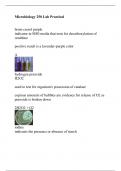
-
Microbiology 250 Lab Practical
- Exam (elaborations) • 37 pages • 2023
- Available in package deal
-
- $12.99
- + learn more
brom cresol purple indicator in MIO media that tests for decarboxylation of ornithine positive result is a lavender-purple color A hydrogen peroxide H2O2 used to test for organism's possession of catalase copious amounts of bubbles are evidence for release of O2 as peroxide is broken down 2H2O2 + O2 iodine indicates the presence or absence of starch agar solidifying agent purified from marine algae colonial morphology size, color, shape, elevation, consistency, ...
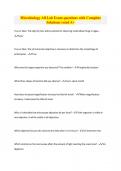
-
Microbiology All Lab Exam questions with Complete Solutions rated A+
- Exam (elaborations) • 18 pages • 2024
- Available in package deal
-
- $11.48
- + learn more
Microbiology All Lab Exam questions with Complete Solutions rated A+ True or false: The high-dry lens will be optimal for observing multicellular fungi or algae. - False True or false: The oil immersion objective is necessary to determine the morphology of prokaryotes. - True What was the largest organism you observed? The smallest? - Fungi/mold; bacteria What three shapes of bacteria did you observe? - cocci, spiral, bacilli How does increased magnification increase the field of vision?...
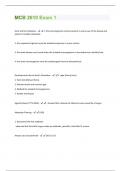
-
MCB 2610 Exam 1 Questions with 100 % correct Answers | Verified | A+
- Exam (elaborations) • 17 pages • 2024
- Available in package deal
-
- $7.99
- + learn more
Koch and his Postulates - 1. the microorganism must be present in every case of the disease but absent in healthy individuals 2. the suspected organism must be isolated and grown in a pure culture 3. the same disease must result when the isolated microorganism is inoculated into a healthy host 4. the same microorganism must be isolated again from the diseased host Developments due to Koch's Postulates - 1. Agar (Fanny Hess) 2. Petri Dish (Richard Petri) 3. Nutrient broth and nutrient aga...

How did he do that? By selling his study resources on Stuvia. Try it yourself! Discover all about earning on Stuvia


